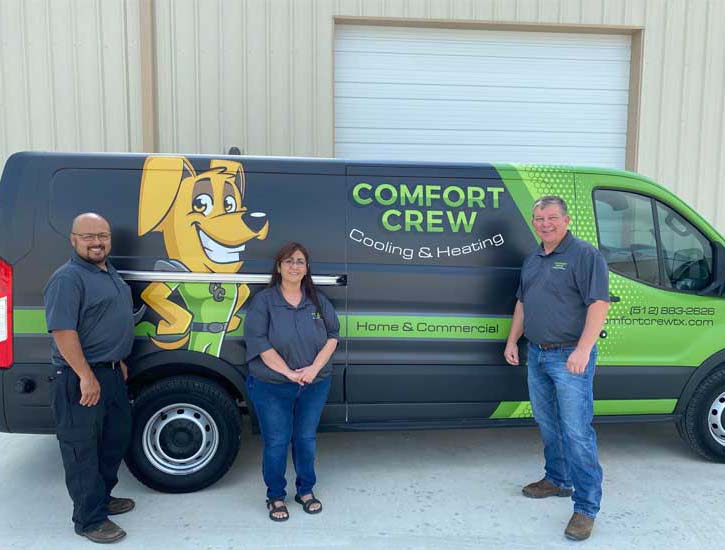Heat pumps are a growing segment of the HVAC market, but many consumers still know little about them. Manufacturers and contractors are working to educate end users about the ways heat pumps work differently from traditional heat sources. It’s the kind of effort needed to further expand their use.
Eddie Glidewell, owner of Comfort Crew Heating and Cooling in San Marcos, Texas, fielded plenty of calls last winter as temperatures dropped in his states. Many of them were from customers worried that their heat pumps were catching on fire. Glidewell explained they were functioning as they should.
“We had to tell them the system is going through a defrost mode to remove any ice that might have built up during the heating cycle,” he said.

ANSWERING THE CALL: Eddie Glidewell, right, and his staff at Comfort Crew Heating and Cooling in San Marcos, Texas, received several calls from customers whose heat pumps went into defrost mode during last winter’s storm.
This ensures proper airflow over the coils. Glidewell gets so many questions about heat pumps that he posted an explanation on his website. Many customer questions concern comfort performance.
“I try to explain to them it’s not an intense heat,” Glidewell said. “It’s a gradual heat. It’s moving heat from inside and basically transferring it to the inside of your house.” The heat pump gets to the same point as a gas or propane furnace, but it just takes a little longer sometimes, he said. It’s more fuel efficient in getting there, using half the amps. San Marcos is located outside of Austin, and Glidewell said high prices in town are driving more home buyers to the exurbs. These houses are perfect for heat pumps.
Vice President of residential business, METUS
Move Toward Electrification Pushes Heat Pumps in New Markets
Manufacturers are doing their part to educate consumers as well. Mitsubishi Electric Trane HVAC US (METUS) is consistently developing training tools, brochures, and other materials to help contractors better educate consumers about how heat pumps work, said Tom Overs, the company’s vice president of residential business. The company recently refreshed its website, mitsubishicomfort.com, with articles and videos to explain heat pump operation and applications. One video even shows heat pumps working in subzero temperatures.
“Our training programs give contractors opportunities to deepen their knowledge of how variable-capacity heat pumps operate,” Overs said. “As contractors become more comfortable with the technology, they’ll be better prepared to set expectations and educate consumers.”
Many new customers are coming from states where heat pumps were traditionally less common, said Regan Axtell, residential product manager of Johnson Controls. Heat pumps were common in the South and mostly used for cooling. A number of factors are driving their adoption in the Northeast and upper Midwest, Axtell said.
One is the move toward electrification and away from fossil fuels. Axtell said many cold-weather states are driving greenhouse gas reduction policies that offer aggressive incentives for heat pumps. Several regional energy efficiency organizations are promoting heat pumps in colder climates as well. For example, Maine recently released a 2020 Climate Action plan that aims to have heat pumps installed in 48% of the housing market by 2030, and several other states are following suit.
Today's Heat Pumps Perform at Lower Temps
At the same time, today’s heat pumps perform at even very low temperatures. Axtell said Johnson Controls puts all of its York heat pumps through rigorous ice chambers and highly accelerated life testing at its manufacturing plant in Wichita, Kansas. These subject equipment to severe environmental conditions that replicate five years in the field to ensure product quality and performance during extreme weather.
Extreme weather drove all those phone calls to Comfort Crew in February. Many parts of the state recorded their coldest temperatures in decades. These type of events seem to be growing more common.
Overs said there are a number of precautions HVAC contractors should take when first installing new heat pumps. This includes elevating the outdoor unit above the snow line and ensuring the equipment has the proper clearances. Contractors should avoid oversizing to cover extreme weather. METUS recommends designing based upon accurate load calculations and installing hyper-heating units and controls to automate changeover to auxiliary systems if necessary.
Overs expects heat pump demand to continue growing as consumers seek out better comfort, IAQ, and energy consumption. Sales this year were boosted by low interest rates that led to more new-home sales and increased spending on home remodeling projects. Those trends should continue.
“As customers continue working from home, they’ll experience the pros and cons of their current heating and air conditioning systems,” Overs said.
Training, Technology
This means more contractors need to educate themselves about heat pumps. Johnson Controls has content available through its Ducted Systems Academy to help train contractors on how to discuss the benefits of heat pumps with homeowners, including the differences among its heat pump portfolio. METUS offers its Mitsubishi Electric Diamond Contractor Program and Trane or American Standard Ductless Pro programs.
As demand grows, heat pump manufacturers are offering new technologies. METUS now incorporates its patented dual barrier coating to prevent the accumulation of hydrophilic particles (including dust and dirt) and hydrophobic particles (like oil and grease mist). As a result, the internal heat pump components keep cleaner, which preserves high-efficiency operation and optimal heat transfer. York launched a horizontal discharge heat pump this year the fits into a smaller footprint. These are designed for high-density areas as more cities move toward electrification.
The move to electrification, more consumers working from home, and improved technology will continue to grow the market for heat pumps. Contractors now need to educate themselves about the offerings so they can help their customers make informed decisions — and so they know what to say when those customers call in a panic during a cold wave.



Report Abusive Comment